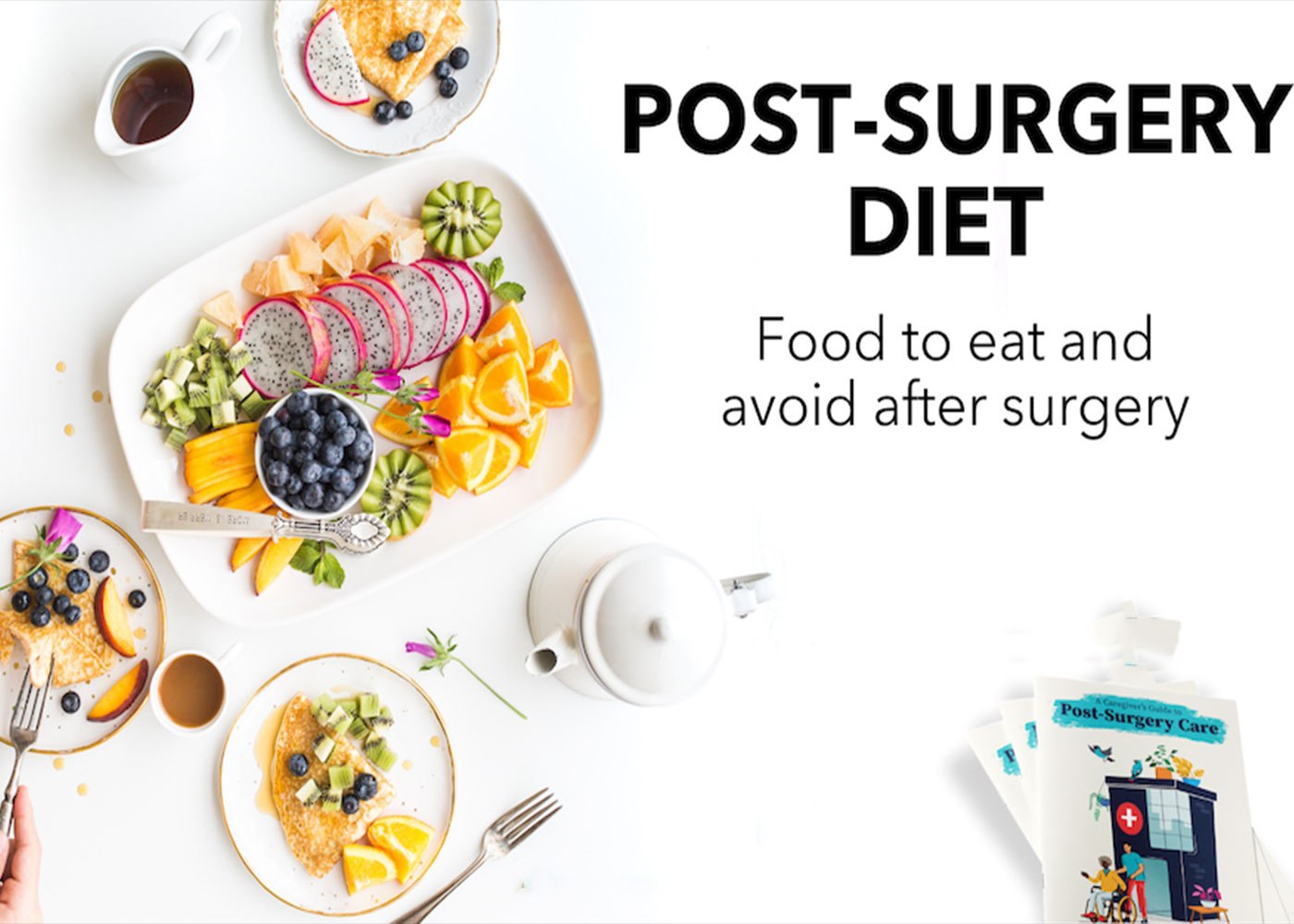Your top goal following surgery would be to concentrate on wound healing and recuperation. Eating properly and sufficiently can speed up your recovery and help you restore your strength, but eating inadequately (or the wrong foods) might cause malnutrition, slow wound healing, and increase infection risk.
The medical staff who handled your case will give your recuperation first priority following a successful procedure. It's best if you can resume your regular activities as soon as possible. And even though you might not feel like eating, keep in mind that getting the right nutrients is one of the best methods to accelerate your recovery.
Always talk to your doctor and/or a nutritionist about your diet after surgery because everyone has different nutritional needs depending on their age, gender, height, weight, any underlying medical issues, and the kind of surgery they underwent.
A suitable after-surgery diet greatly speeds up wound healing and gives you enough energy to perform other recovery-related tasks, like physical therapy. Additionally, it's important to eat the proper foods at the right times to prevent adverse effects like constipation and elevated blood sugar, which can hinder your ability to heal.
After surgery, certain meals may be helpful to promote healing and recovery. As a general guideline, be aware that your body will probably require more calories, protein, water, vitamins, and minerals while you are recovering.
Please remember that your doctor will provide you with detailed dietary guidelines. They will provide you with a list of things to eat, foods to stay away from, and when it's okay to resume your regular diet. You should heed the doctor's advice since they took into account more than simply the type of surgery you underwent; they also took into account your pre-existing medical issues and present state of health.
Here is a list of items to eat and steer clear of after surgery to give you an idea of the typical post-surgical diet.
Four Foods To Avoid Following Surgery
1. Potentially Constipating Foods
Although it can occur after any surgical operation, constipation is frequently experienced following intestinal surgery. One explanation is that some prescription painkillers, particularly opioids, commonly taken after surgery, can impede bowel motions and make stools difficult to pass.
Additionally, being constipated can cause a decrease in appetite, an increase in pain, and stress on surgical wounds. These elements may hinder your ability to heal.
Your overall inactivity and the prescription painkillers you take together can raise your risk of constipation, which can ultimately cause serious discomfort (and occasionally severe pain). Constipation can also cause straining, which could stress or irritate the wounds from your incisions.
In general, stay away from high-fat foods, eggs, dairy, and sweets. The National Institute on Aging (NIA) states that because certain foods are poor in fiber, they may cause constipation.
While some meals can increase the risk of constipation, others that are low in fiber can help prevent or treat it.
As a general guideline, stay away from low-fiber foods until your bowel movements are soft and regular once more. These consist of things like:
- Red meat
- Cheese
- Meats such as bacon and hot dogs that are processed
- Pasta, crackers, and white bread
- Sweet treats and snacks

2. Highly-Processed Food
The majority of processed foods are extremely low in fiber, vitamins, minerals, and nutrients. Additionally, they could be heavy in sodium, fat, sugar, and preservatives. You ought to stay away from processed foods like fast food, chips, and fries.
Speak to your doctor and/or dietitian for individualized nutritional suggestions that will aid in your rehabilitation because every person's condition is different.
After surgery, eating correctly will help you recover more quickly, give you more energy, and keep you from feeling tired and constipated. By choosing healthy foods, you can help your body heal more steadily and more rapidly, enabling you to get back to your regular activities.
3. Spicy Food.
On this list of foods to steer clear of after surgery are spicy foods as well. Spicy foods can upset the stomach, therefore surgeons frequently advise against eating them just after surgery.
A 2010 study also revealed that curcumin-rich spices like turmeric and ginger may help lower the risk of fatal blood clots. However, excessive curcumin may prevent blood clotting, which is crucial for wound healing.
4. Alcoholic Drinks
Despite the fact that having surgery will make you want to drink alcohol, one of the things you shouldn't eat after having surgery is alcoholic beverages. Alcohol and painkillers cannot be coupled, for this reason.
Additionally, drinking alcohol can cause dehydration, and you need all the fluids you can get after surgery to recover rapidly.

Foods To Avoid Following Surgery, According to TCM.
You must have read about recommendations from Traditional Chinese Medicine if you've been researching the post-surgery diet.
TCM advises against eating foods like chicken and seafood following surgery, for example. Although there isn't much data to support this assertion, experts continue to hold that poultry and seafood are excellent sources of lean protein.
Finally, you must be aware that soy sauce should be avoided because it darkens wounds. This, however, is a fallacy because scarring is a normal part of the healing process and how noticeable a scar is frequently depends on other factors, such as how you treat the wound until it is fully healed.
Highly Recommended Post-Surgery Foods for Quick Recovery.
A post-surgical diet necessitates discussing items that may hasten your recovery in addition to the things you must avoid following surgery. So, after surgery, what should you eat?
1. Clear, full-bodied fluids
Prior to discussing healthy solid food following surgery, let's first discuss clear and full fluids. If you have a major operation, particularly one that affects the gastrointestinal tract, the diet of choice may be clear and full of fluids.
You can get the optimum nourishment from a clear liquid diet without endangering your digestive system. Clear fluid basically means the fluid has no (or very little) solid food in it, making digestion for your GI tract easier. This is not to say that you'll exclusively drink "transparent" liquids.
Here are a few examples of clear fluids:
- Water
- tea and coffee, but no milk or cream
- a clear soup
- Juice that is clear and fresh, like apple, cranberry, and grape.
- honey and regular sugar
- Jell-O Popsicles
However, a full-liquid diet that includes a "fuller" or thicker liquid may also be part of the post-surgery diet. You can have full-liquid examples like:
- creamy soups and cereals
- Yogurt
- Gelatin
- Simple ice cream
- Juice from fruits and vegetables
All foods and beverages on the clear liquid list are acceptable when following a full-fluid diet.

2. Whole Grain Foods
Top among the finest foods for a diet after surgery are whole grains. They are a great source of fiber and carbohydrates that give you energy, but they are also a great source of vitamins and nutrients that keep your body strong and prepared for healing.
You may include whole grains in your diet in a variety of ways. One of them is choosing cereal for breakfast and eating rice. Please keep in mind to select whole grains rather than refined ones (such as white rice, white flour, etc.).
The finest whole-grain foods to include in your diet following surgery are listed below:
- Oatmeal
- Cereals
- Whole-wheat crackers, bread, and pasta
- Brown rice,
- Barley, and Oats
Consider your folic acid consumption when selecting whole grain foods for your post-surgery diet, according to specialists. According to them, folic acid, a type of B vitamin that aids in cell function and tissue growth, is not typically added to whole-grain foods.
3. Organic food
Fresh produce comes next on our list of the healthiest meals to eat after surgery. Like whole grains, fresh fruits and vegetables are abundant in fiber and minerals. They are also a great source of antioxidants, which aid in preventing inflammation caused by free radicals.
In the absence of fresh fruit, canned and frozen fruit are equally acceptable. Please pay attention to extra ingredients, especially sugar.
However, avoid eating too many fruits and vegetables because doing so could result in gas, which can be very painful and uncomfortable. And while being gassy usually lasts no more than a day or two, it can still result in abdominal cramps that may need treatment.
The following fresh foods are the best to consume after surgery:
i. Berries, since there are so many varieties to choose from, including blueberries, blackberries, and raspberries. Vitamin C, a component that aids in the synthesis of collagen for skin repair or wound healing, is a significant antioxidant present in berries.
ii. Oranges, grapefruit, and pomelo are examples of citrus fruits that are great providers of vitamin C.
iii. Apples, peaches, mangoes, papaya, peaches, and melon are just a few other colorful fruits that are excellent after surgery.
iv. The vitamins A, C, and E are abundant in leafy greens such as spinach, bok choy, romaine lettuce, and kale. They aid in quick blood clotting as they contain a high amount of vitamin K.
v. Snackable vegetables include Brussels sprouts, cabbage, broccoli, cauliflower, and carrots.
The best option is, of course, to eat an assortment of fruits and vegetables, since this will ensure that you are also consuming a variety of the micronutrients your body requires for healing.
4. Sources Of Lean Protein
Low-fat protein sources are those that contain little fat. Protein-rich diets help with tissue repair and infection prevention, making them essential foods for wound healing following surgery.
Some of the top sources of lean protein are listed below:
- Lentils, chickpeas, and kidney beans are preferred legumes.
- Only choose the white flesh from
-Tofu
-Poultry.
- Fish and Beans
- soybean
- lean beef

5. Healthy Fats
Even though it might be a bit difficult to believe, a post-surgery diet is incomplete without healthy fats. The immune system is strengthened and infections are prevented by fats. Additionally, consuming healthy fats improves your ability to absorb the nutrients from all other food categories, notably those from fruits and vegetables.
The following include the best sources of good fats:
- Olive oil is a versatile cooking and salad dressing ingredient.
- Coconut oil
- Nuts and seeds
- Avocado
6. Foods That Reduce Inflammation
It's a good idea to take anti-inflammatory foods into consideration if you're seeking for meals to promote wound healing after surgery. These foods essentially reduce inflammation, may reduce swelling, and may even prevent disease.
- Fruits
- Savoy cabbage
- Olive oil
- Nuts
Another excellent anti-inflammatory food is fatty salmon, but before deciding to add it in your diet, check with your doctor first.
7. Calcium-rich food sources
Adults also require calcium to maintain bone and muscular strength, healthy blood coagulation, and improved nerve impulse regulation. Calcium is not just important for developing children. Calcium-rich meals are excellent post-surgery nutrition due to these functions.
You could prefer to rely on substitutes instead of dairy because it raises the risk of constipation. Some examples include:
- Leafy greens, Dar
- Sardines,
- Products made with soybeans and calcium include cereal and orange juice
Consider selecting the low-fat options if you can have dairy without becoming constipated.

8. Foods high in iron
A significant portion of iron is included in hemoglobin, a kind of protein found in red blood cells that transports oxygen from the lungs to every area of the body. Weakness or weariness may result from low iron levels. To refill red blood cells, think about including iron-rich foods in your post-operative diet. The following foods have high iron content:
- Meat, particularly beef
- Animal organs
- Poultry Seafood
- Breakfast cereals fortified
- Seeds and nuts
- Improved bread
- Spinach
9. Chinese Soups
After surgery, a bowl of Chinese soup could be something to look forward to. Chinese soups are rich in vitamins and antioxidants since they frequently contain a variety of vegetables and herbs. Furthermore, a lot of Chinese soups are made with chicken, so you'll get your fill of protein as well.
Let's take a look at the results of a 2019 study that sought to assess the medicinal plants used to make soup to give you an idea of how beneficial a Chinese herbal soup is after surgery. According to the study, around 42 medicinal plant species are used in a specific soup, and the following are their most common applications:
i. Lucid internal heat
ii. Minimize inflammation
iii. Ward against the cold in the body
After surgery, consuming snakehead soup may be advantageous since it may hasten wound healing. One study even found that utilizing a snakehead spray improved the aesthetic results and pain score following surgery.
Let's not overlook the black Chinese soup after surgery, though. This Chinese soup, which is made from black chicken, is not only a fantastic source of protein but also of antioxidants, vitamins, iron, calcium, and protein.
Here are a few things to keep in mind when preparing Chinese soup as part of your post-surgery diet:
- Due to the lipids in the ingredients, especially the meat, Chinese soups can become very oily. Take additional care to avoid this. Use lean meat and stay away from the fatty portions of poultry, beef, or fish as a result. Oil-separator spoons can also be used to manually remove excess oil from food.
- Remove the meat's skin to reduce the amount of oil that ends up in the soup.
- Increase the amount of veggies and herbs in the soup because more of those ingredients will aid in your recuperation.

10. Fish Essence.
Perhaps you've also heard of using fish essence to recover from surgery. Fish essence contains elements that promote recuperation, therefore it may be included in a post-surgery diet.
For instance, the "essence of fish" principal ingredient is touted as a healthy diet for post-operative wound healing. In addition, many fish essence supplements contain other helpful components like ginseng, which strengthens the immune system and increases vitality.
11. Chicken Essence
You might also want to think about chicken essence, which is created from the extract of premium chickens, in addition to fish essence. It keeps the body and mind alert after surgery and is a beneficial diet in general.
For instance, a study that found chicken essence to be effective at reversing mental exhaustion came to the conclusion that it might be a diet that prevents fatigue. Another article also indicated the immune system-boosting, antioxidant, and stress-relieving properties of chicken essence.
Catering For Post-Operative Meals In Dubai
Have you had significant surgery recently? You won't have to fret about your meals while you're in the hospital. However, maintaining your diet may be more difficult once you've been discharged from the hospital.
Consider using a post-surgery meal catering service in Dubai if you're seeking a practical approach to maintaining a healthy post-surgery diet.
You have the freedom to select from a range of nutritious meals that the catering service can deliver to your home when you order post-surgery food delivery in Dubai. Energy Meal Plans Dubai frequently provides you with post-surgery packages between one or several daily meals. Additionally, they can provide you the option of choosing between 7, 14, 21, or 28 days.
The amazing thing about Energy Meal Plans Dubai's post-surgery catering services in Dubai is that they guarantee that the meal is nutritious. Most services feature meals that use less oil and salt and are free of sugar and MSG.
Summary
After discussing post-surgery meal catering services in Dubai, it's important to remember that the items listed above are only basic recommendations. When it comes to your post-surgery diet and nutrition, you must still go by the doctor's instructions.
Take whole-wheat bread as an example; while it may be a wonderful source of fiber, if you have gluten sensitivity you may want to switch to gluten-free grains. Similar to how some foods that cause constipation are accepted by others (like eggs), your doctor might let you eat them. Your post-surgical diet will depend on the sort of surgery you have and the medications you take.
After surgery, eating a lot of healthy foods stimulates wound healing, promotes recovery, and reduces constipation. In light of your operation and general health, you should speak with your provider about the precise foods you can and cannot eat.
In general, pay attention to whole foods and stay away from processed foods that are heavy in sugar and saturated fat and lacking in fiber. You can maintain appropriate nutrition even if you aren't hungry by eating frequent, modest meals as opposed to three huge ones that you won't be able to finish.
Follow the doctor's instructions carefully to be certain of the things you can consume following surgery. You might get in touch with them once more later to adjust or change your diet.






























